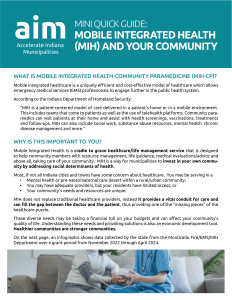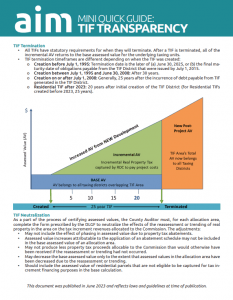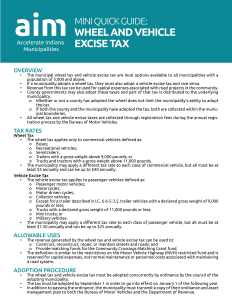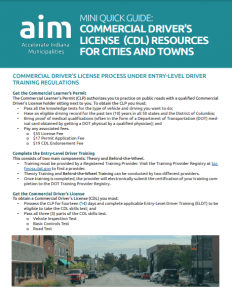Publications
2024 Aim Handbook
The Indiana Municipal Officials Handbook is a nearly 300-page reference guide published by Aim for city and town officials. The handbook reviews the structure and operations of city and town government, applicable statutes, and sources of state and federal programs.
Although the handbook is traditionally published every four years, we now offer annual updates to reflect legislative changes and critical procedural updates. Replacement pages for printed handbooks are designed to fit seamlessly over existing pages. For digital users, a fully updated version is available. Update pages are noted in the running header, with changes highlighted in red for easy identification. If you already have a printed handbook or have requested the digital version, you can obtain the updated pages by contacting klubelski@aimindiana.org.
Municipal Membership Copy
Provided as a member service, every city and town member of Aim will receive one copy of the Handbook. Aim will use 2023 dues paid to determine municipal membership status. For cities, the member copy will be mailed to the Mayor. For towns, the member copy will be mailed to the Clerk-Treasurer. A city or town will be allowed to pick up their member copy at Boot Camp provided they sign for the Handbook. Handbooks not picked up will be mailed to the city or town within two weeks of Boot Camp.
Digital Copy
The link to a digital copy of the Handbook will be provided at no charge to all Aim Municipal, Corporate, and IMLA members.
Mini Quick Guides
Housing Resource Guide
The inaugural Indiana Housing Guide is a joint effort of Aim, the Indiana Association of REALTORS® and other public, private and non-profit partners working in the housing sector. This Guide inventories the array of public incentives, financing mechanisms and various state and federal programs available to local elected officials, redevelopment commissions and other partners to expand housing supply to meet – and anticipate – demand.
Guide to Public Purchasing
The 2024 Public Purchasing Guide provides a general guide to Indiana’s public procurement laws – specifically those statutes governing the purchase of goods and services. The Guide is intended to provide Aim members with a basic understanding of the procedures surrounding purchasing. The Purchasing Guide is for Indiana’s cities and towns, and for special purpose entities such as park districts, redevelopment districts, and storm water districts established by individual municipalities.
Aim Budget Bulletin
Aim annually publishes a comprehensive guide to municipal budgeting, and each of our municipal members receives a copy of this valuable administrative resource. The 2025 Budget Bulletin is designed to assist city and town officials with the responsibility of developing and adopting a budget. The first section of this publication is a narrative that discusses some generalities of the Indiana municipal budget process, including how to determine expenses and revenues, and how to balance the budget. The text organizes the budget process into the logical steps that a municipality would take to reach the final adoption of a budget. Supplements follow to help with specific components of a municipal budget. All municipalities may not need to use the information provided in every supplement to complete a budget.
Protests & Public Safety: A Guide for Cities and Citizens
In the present moment, it is more important than ever that local jurisdictions understand their role in fostering First Amendment activity while protecting the safety of protesters and the public. Having developed a body of knowledge and proven results, the Institute for Constitutional Advocacy and Protection seeks to scale what it has learned by providing this toolkit of legal options. In it you will find legal principles, best practices, and creative solutions upon which local jurisdictions may draw to protect public safety while respecting constitutional rights during rallies, protests, and other public events. The toolkit offers detailed legal analysis suitable for municipal and state attorneys, as well as more general legal guardrails, best practices, and frequently asked questions intended to be more easily accessible to non-lawyer elected and appointed officials, concerned residents, and activists.
State of the Cities 2021, National League of Cities
State of the Cities 2021 examines how the COVID-19 pandemic has exacerbated critical issues facing municipalities. Some key statistics describing the challenges that our cities face include: 39% of officials indicated that roads and bridges were experiencing declining quality over the past year; 63% of urban officials reported increases in homelessness; 37% of officials say affordable housing supply is the most prominent factor driving negative local outcomes; and 68% of officials reported increases in the need for small business emergency assistance.
Every city, town and village has felt the impacts of the pandemic. However, existing infrastructure was a key factor in determining how a community was able to respond and exercise resilience. Understanding how and why municipalities fared differently provides insight on why robust federal investments are crucial in weathering crisis. 40% of local officials indicated that access to clean drinking water was one of the most significant positive conditions supporting their communities; 20% of local officials indicated broadband availability as a leading positive driver, while 15% indicated it posed the most significant challenges for their residents over the past year; and 43% of municipalities indicated that the availability of parks, recreation and community green and open spaces was a top condition supporting their communities.




